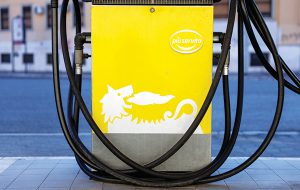Bloomberg
Eni SpA raised share buybacks after profits surged due to high oil and gas prices.
The Italian oil giant will repurchase a further 1.3 billion euros ($1.3 billion) of shares this year, raising the total to 2.4 billion euros, which is close to the top end of the previously specified buyback range.
Investors in Big Oil are receiving a windfall after Russia’s invasion of Ukraine disrupted energy supplies and sent prices soaring. Almost every major European oil company to report second-quarter earnings so far, from Norway’s Equinor ASA to France’s TotalEnergies SE, has boosted shareholder returns after their profits surged.
“Financial delivery is underpinned by our continued efforts on efficiency and cost control,†Chief Executive Officer Claudio Descalzi said in a statement on Friday. “Based on these robust results and our updated market outlook, we are enhancing shareholders’ distributions.â€
Eni shares rose as much as 3.1% as of 9:18 am in Milan. With just over 300 million euros of repurchases so far this year, RBC Europe Limited’s Biraj Borkhataria said in a note that the expanded buyback could account for just over 7% of the average daily trading volume.
Eni’s second-quarter adjusted net income was 3.81 billion euros, up from 929 million euros a year earlier and beating the average analyst estimate of 3.14 billion euros.
“The main driver of the beat is exceptional refining and marketing, which saw 979 million euros of adjusted Ebit versus a consensus of 580 million euros,†Jason Kenney at Banco Santander SA said in a note.
Eni said it expects its downstream division to deliver adjusted Ebit of 1.8 billion to 2.0 billion euros this year.
The company made a modest increase in planned spending, with organic capital expenditure rising to 8.3 billion euros for the year, from 7.7 billion euros previously. The target for new resources to be discovered increased to 700 million barrels of oil equivalent, up from 600 million.
Eni has been helping the Italian government to diversify gas supply away from Russia since the war started in late February. The country has reached deals to increase gas imports from African countries including Algeria, Congo, and Egypt.
“Amid uncertainty and volatility in markets, we moved fast to secure new energy supplies,†Descalzi said. Those initiatives are designed to deliver the equivalent of Russia’s 20 billion cubic meters of annual gas exports to Italy by 2025. Further supply could come from agreements with Libya, Angola, Mozambique and Indonesia, or expanded domestic production.
 The Gulf Time Newspaper One of the finest business newspapers in the UAE brought to you by our professional writers and editors.
The Gulf Time Newspaper One of the finest business newspapers in the UAE brought to you by our professional writers and editors.
